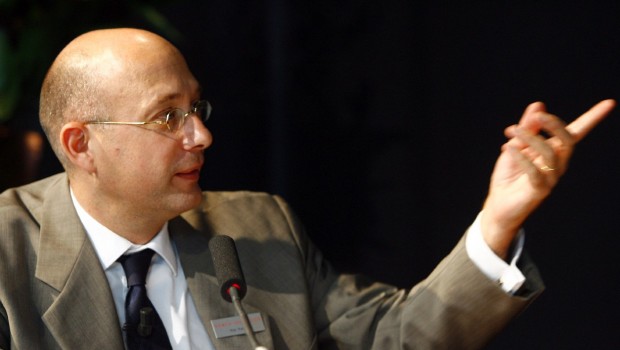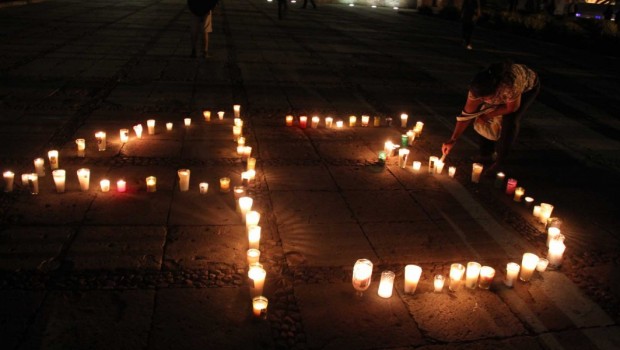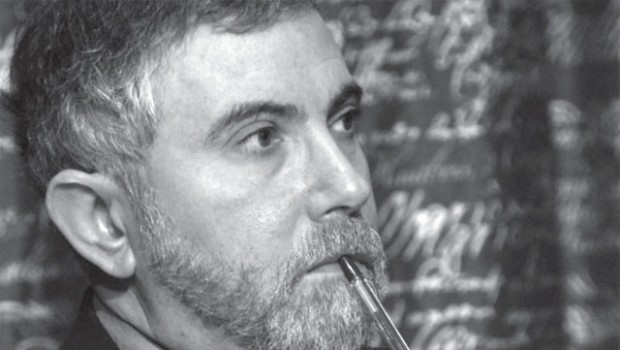Rob Riemen: The Betrayal of Our Intellectuals
La traición de nuestros intelectuales
Rob Riemen
Rob Riemen is the founder and president of the Nexus Institute, a Netherlands-based leading international center for intellectual and philosophical debate, that seeks to give shape to an informed dialogue between decision-makers and the world of ideas. Riemen is the author of Nobility of Spirit (Yale University Press, 2008).
* * *
Rose Mary Salum: Your book is a long reflection on the active role of intellectuals in society. It plunges into the deep waters of the history of thought and claims the return of the intellectuals. How would you work out the return of intellectuals into the XXIst Century?
Rob Riemen: I studied Theology and I vividly remember the following anecdote from the Gospel when Jesus says “faith can move mountains.” My professor then explained it happens gradually. I personally believe in a steadily change. First of all, it is important to create awareness about the kind of society we are presently living in. How can things that are not important at all be considered so important in our society? Yet, our present failures seem to be shaping our society. Today we’re in Mexico City, and one increasingly reads about the narco culture in which young people are seduced by it because of the promise of excitement and material goods. This is a symptom of the cult of success created and fed by the media. What is ignored in this presentation of an “ideal life” is the fact that life exists on an entirely different dimension. Unamuno, the great Spanish philosopher, wrote this wonderful book about what we seem to have forgotten at the beginning of the XXIst Century: the sense of the tragic. This aspect of life exists whether we like it or not. I was recently informed about the phenomenon in America where millions of young people, kids in their twenties, are using medical drugs without having mental disorders. They are using Prozac, Ritalin. Why? I think because, they cannot live with their own dissatisfaction of life. They feel they are under- performers, that they are not really a success. They have the idea that they are not meeting those standards we mentioned before to be deemed successful in life. Imagine the horror of a society where children no longer learn to have a certain amount of introspection. There is no soul searching anymore. They are no longer developing the language to understand themselves—not to mention that they cannot even understand others. We are heading into this Brave New World phenomenon in which we have to be happy, where the greatest horror is to be unhappy and where success can only be defined in the material terms of cars, sex and money. Now, the price paid is that life becomes totally, utterly meaningless.
I apologize for the long description, but we have to clear the grounds and we have to become aware of what it is actually going on.
Hence, we return to the topic of the intellectuals. For as long as society has existed, there have been scribes, who were the knowledgeable people that reflected on, interpreted and transmitted scriptures. In addition, as a balance to kings and priests, there is always the prophet, the truth-teller. The intellectual, in my perception, is a kind of secular variation of those two types. The scribes are now found in the academic world as the scholar studying, interpreting and writing texts. “The prophets” are found in public intellectuals. They are the people on the fringe of the society questioning where are we going and what are we doing? Or the ones that tell us that the emperor has no clothes as the classic story tells us. In the XX Century we’ve had Unamuno, Ortega y Gasset, Thomas Mann, Kafka, Pessoa even Borges, the kind of prophet-like people who had a lifelong commitment to the search of truth and sought to transmit it through their work. There later came a group of intellectuals—especially in relation to Marxism— for whom it was not as important to interpret the world as it was to change it through power. We can understand the emotions behind this, but we now know the devastating consequences of the kind of society where there’s only one ideology people have to confront. Intellectuals moved into the world of power and became much more interested in power than in anything else. They ignored truth, and as a consequence came this world of post modernism where there is no truth, only social context. Anything goes. That has become the dominant attitude in the academia. We have accepted the fact that there can only be differences of taste. Some like Mozart, others Madonna. Who could care in the end? This attitude has also influenced the world of ethics. We often hear “My ethics are not your ethics. Your laws are not mine.” So we have given up the notion that there are universal values. These are all complex things, and they have political consequences.
So, to wrap up, I would like to state the fact that the intellectuals should understand that they will never be powerful. They have to accept the fact that they will never live the kind of glamorous lives the media offers. It’s perfectly fine if they decide they want to become part of the Obama administration, but at that point they should stop living their life as intellectuals and become policy people. We always need policy people, but we also need good, serious intellectuals. This is where the role of the universities comes in regards to their tremendous responsibility, especially to the realm of humanities which gives students a critical view of the world. Here it is where we could get started.
RMS: You’ve commented several times that one cannot make an absolutely essential, legitimate and necessary criticism of current times in the Western Hemisphere without taking into account a very important factor: the moral difference between good and evil.
RR: Yes. It relates to what I just said. In regards to that, society seems to have become lazy when it comes to being critical. Furthermore, people are afraid or don’t want to seem elitist, but mostly, it is connected to this idea that “anyone is entitled to give an opinion.” And last but not least, the whole politization of society. Good and evil now relates to be left or right: to be a liberal or conservative. That is stupid and it is dangerous. We saw a collapse of the intellectuals in regards to 9/11. Certainly, it was a horrible thing, but nothing new. It’s part of mankind, you know? We have Darfur, the Balkans or Rwanda, but 9/11 was a world event. We had intellectuals being published in the best newspapers of the world: Le Mond, Diplomatic, London Review, etc. who wanted to make the academic claim that we should try to understand why 3,000 innocent people from all parts of the world, be it Africa, Latin America, Asia, were killed. We were told we had to understand it because of globalization and capitalism. And then you arrive at a kind of existential question which is: how is it possible that people, after reading all the books to be read, who had the best university educations, who go to an opera or concert every week, can no longer distinguish the difference between good an evil? We are now in this wonderful hotel and we know there are many uneducated ted people here, but all of them understand it is a bad thing to kill, and it is definitely bad to kill 3,000 innocent people who don’t have a thing to do with capitalism, or globalization.
I write books, I write essays and I run an Institute that, as all universities and cultural magazines—like Literal—, is based on the article of faith that culture does matter. If so many prominent people in the world of culture can no longer distinguish a moral difference between right and wrong, then why should we continue thinking or talking? Because of this question I did a lot of soul searching. It was a quest in which I discovered that the betrayal of the intellectuals is part of the intellectual life. Already Socrates had to deal with it, as later on Thomas Mann did. We also saw it before WWII. The best professors in Munich applauded Fascism! Stalinism was accepted and praised by many first-rate intellectuals, and only few courageous people like Octavio Paz or Albert Camus had the courage to oppose it. Those intellectuals discovered that the bottom line of life is that one must live in truth and have a certain notion of what is good and evil. So the connection to be made is between living the life of an intellectual and having a commitment to truth understanding that this truth must translate into the knowledge of what is good and what is evil. Before the Ten Commandments, there was a time of paganism when we sacrificed children. There has been some moral progress. So don’t come back to me with that kind of intellectual crap in which you say that since we are from a different culture, we can’t understand somebody. No. There are universal values and one of the key values is the right to life. This is a concept in the Gospels, in Buddhism, which was also rediscovered by Kant, and we cannot give this up.
RMS: In your book you mention two possible reasons why an intellectual could stray from his path: desire for power and his own scepticism with respect to the eternal values. Would you say that rationality is the third reason intellectuals are giving up truth?
RR: At the end of my second essay I reflect on why intellectuals are not playing their role or accepting their responsibilities. I give a number of reasons; one of them is indeed the impact of scientific paradigm. Truth is mathematical or empirical, but it’s not longer metaphysical. Yet you cannot reduce all the main qualities of life to empirical or logical definitions. The influence of the scientific paradigm on intellectuals is such that they’ve lost the art of writing. Most of them include excessive amounts of footnotes that no one comprehends. This is good when you’re a scholar, but when you want to deal with ideas, you don’t need to use footnotes.
RMS: But don´t you think that these conglomerates can have a subtle yet rather coersitive pressure against intellectuals?
RR: I agree. We are faced indeed by a very serious situation. There have always been the groups of the power, but even in the Middle Ages and the Renaissance, intellectuals were very respected and important. This respect is completely absent, but we must blame the intellectuals first. Also, there is a society-wide censorship created by the world of money. B&N is not a bookshop; it is a phenomenon that kills bookshops. There is no interest at all in a cultural infrastructure. North American culture is collapsing as we speak because of this. Therefore, where can people go to, how can they be possibly informed that there is a new book? The media will not pay attention to it. They are in what one might call “automatic mode.” For them to acknowledge it someone has to be famous or it has to be about power or sex. These problems are not completely new but things are getting worst, and because of this an enormous responsibility lies on the part of intellectuals to keep their integrity and to do what they truly believe in. Literal, your own magazine, it’s important because it is one of the few oases in the dessert, where the transmission of culture can take place. So, only the people who have courage, energy and the passion to continue can go against the current, whether they are independent magazines, bookstores or publishers. The key word is independence. I’m sure there are many companies who have money to support these projects, but there is a lot of work to be done and it will take time. A friend of mine, an old Jewish publisher with whom I started the journal Nexuus, once said to me— and I never forgot it— “Rob, you have to understand that although we live in the late XX Century, on a cultural level, we live in the Middle Ages.” And our journal, Nexus along with the institute, have become one of those secular monasteries where we do our work waiting for better times. It’s important, now more than ever, to keep building and encouraging these secular monasteries such as publishing houses, journals, institutes of fine studies or reading clubs.
RMS: In Dix raisons (possibles) à la tristesse de pensée Steiner claims that the media is subtracting the meaning from words. Do you agree?
RR: John Stuart Mill, published On Liberty in 1859, documents the beginning of mass media. His analysis explains that there cannot be a functioning democracy without free media. Yet the horrible truth is that the media itself has turned into the greatest threat to freedom because of the tyranny of the public opinion and the conformism it inspires. The media is neither interested in truth nor committed to democracy; they are committed to sales and profits. They’re looking for the greatest common denominator, which is always sex, war, crime and violence. That is what they focus on and they call “news.” The rest is of no importance at all. The average concentration span is now down to 26 seconds; therefore any topic on the news has to be dealt with in no more than 2 minutes. The specialist who will tell us about the bailout will likely get less than a minute. All is reduced to bullshit! However, their impact and power— especially because they’re global— is phenomenal. We pay the price of not knowing what’s really going on. There is a money machine behind this, no doubt.
In regards to the decay of language, sure! The media has absolutely contributed to it. The mass media should be more modest and realize what its true and sole function is: to inform us. The New York Times is important because they have international correspondents everywhere. This should guarantee us the true facts about of what is going on in Russia, China and other countries. However, the very moment they get into to the world of making opinions everything goes wrong. Plato made a clear distinction between having knowledge and having an opinion. This is the reason they can’t replace books or bookstores. The same goes for the internet. Bookshops are irreplaceable because in them you discover what you didn’t know before.
RMS: Going back with the media, it seems that once they give us opinions, they become institutionalized by the consent of millions. Then you are far from truth.
RR: And the most horrible part is that they always consciously try, since they are only interested in what the public opinion is. If the media were completely opposed to mainstream public opinion, who would buy their newspapers? Who would listen to them? That’s why they only voice public opinion and so try to influence it at the same time. People are tired of being fooled by the media. So we have to wait and see what’s happening with the creative energy, because some good things might come out of it. I’m quite fascinated by what’s happening in the blogsphere, because it is a democratic tool. Anyone can start their own blog, have it spread itself and even have people become interested. There’s always a person writing about interesting things. Let’s hope that this creative energy will find its own forms and ways. Let the media collapse!
RMS: Talking about your letter to President Obama— I felt fascinated by it.
RR: Not published by The New York Times because it was too historical.
RMS: Unbelievable! They always find their way around things, right? Anyhow, in that letter you remind him that Mann once wrote in his diary (and I’ll quote you) “Roosevelt’s reelection is of the greatest importance for the further course of history. However, the current era makes this unlikely…” Do you think the current era makes it unlikely for President Obama (as well as society as a whole) to return the old principles? Is this ideal a dead song?
RR: I must say the election of President Obama is one of the very few positive signs about the world circumstances. Look at the situation in Russia, the financial crisis, what could have been if Sarah Palin had been elected as president (because, the president would not have been McCain). I was most pleasantly surprised by the American society when, after the Reagan era, after Bush 1 and after Bush 2 twice, they voted for Obama. I think Americans have many reasons to be extremely proud, especially because it was the younger generations who gave Obama the presidency. They went out, they voted and they did the job for him. I’m positive that many young people know that they are being fooled. They are fooled by society, by the celebrity cult, by the mass media and by the education system. They no longer wish to be told what to do. With Obama, it became transparent he was the right guy. Now Obama is there facing incredible problems. Can he fix them? Like he said, not even in four years. Yet, we should remain hopeful that we can change our community, our university etc. How? Just doing the bloody thing. What I mean is, do not accept any bullshit anymore. If you find classes are stupid and boring, don’t go to them. If all the students would decide not to attend for at least three months, the whole bloody system would change in a week. If we don’t buy into the celebrity cult, it will disappear in two days. Our financial elites are so backwards, but we can change them because they rely on us. Let’s use this financial crisis to make some things clear. We’ll buy your goods, but give us quality goods; we’ll go to your university but give us a proper education. My hope is that Obama is the first very positive step. He has to do the right thing. He has to have the courage to go for the right things. Many of his predecessors only cared about reelection, the short term, but we elected him for the long term.
RMS: In your view, do you think universities already became part of this whole market, the consumerism world?
RR: Oh yes, they exist to serve the world of the commerce. Look at the deceitful notion of usefulness. Everything has to be useful now, but go to the mirror and ask yourself “are my friendships useful?” The very moment you think of a friendship as useful, it will be gone. If you think that your kids are useful, there something is deeply wrong with you. It is not useful to be a good human being, either. Will you gain profits from telling the truth? No, you could even lose your job for doing so. This whole notion of usefulness is a lie..
RMS: This a rather personal question, but after our conversation, I wonder what is it exactly that moves and motivates you? You must admit that in a materialist and consumerist era, such ideas could even be suicidal.
RR: I’m very much surprised by your question because it is not my experience at all. In a certain sense, I live on an island because I only meet with people like me. I created my journal, I started my Institute, I wrote my book and I only meet people who are interested in these things, such as you. I’m used to, and demand even, good conversations. Why? I think that the simple answer is life is too short. Why I should waste time? I have a couple of good friends, and I have my very best friend to whom I dedicated my book. Why should I waste time on the emptiness that surrounds us? You know, I love movies, especially comedies. I’m a great fan of Steven Spielberg’s films because I think he’s a genius in translating big questions into a kind of visual language. We shouldn’t underestimate the brilliance of people that work “in popular culture.” The point to be understood is that we only have one task take care of, and that is the phenomenon of emptiness and nothingness. A highbrow intellectual term is nihilism, and a synonym is kitsch, by which we are completely surrounded. It all comes down to the fact that there is nothing in it. You can effect change when you know the kind of energy you are made of. The only thing we can learn from the celebrity magazines is that celebrities are not happy. So you asked why I do what I do, and I say: because life is too short.
Rob Riemen es el fundador y presidente del Nexus Institute (Holanda), un centro internacional de vanguardia para el debate intelectual y filosófico que busca propiciar un diálogo entre personas con poder de decisión y el mundo de las ideas. Riemen es autor de Nobleza de espíritu (El Equilibrista, México, 2008).
* * *
Rose Mary Salum: Tu libro es un amplio análisis sobre el papel de los intelectuales en la sociedad. Se sumerge en las aguas profundas de la historia del pensamiento para, al final, sugerir el retorno de la reflexión a un papel protagónico en el presente. ¿Cómo sería este retorno dadas las condiciones adversas que nos presenta el siglo XXI?
Rob Riemen: Realicé estudios en Teología y desde entonces recuerdo claramente una anécdota de los Evangelios en donde Jesús afirma que “la fe mueve montañas”. El profesor nos explicó que aunque esto es verdad, siempre sucede paulatinamente. Por mi parte, creo también que cualquier cambio de orden mundial no puede realizarse de un día para otro. Antes que nada, es necesario tener ideas muy claras acerca de la sociedad en la que vivimos. Por ejemplo, ¿por qué ciertas cosas sin importancia adquieren tanto valor actualmente? Hoy parecería que nuestros fracasos como sociedad son los que nos están dando forma. Así, en la ciudad de México se lee cada vez más sobre la cultura del narco porque los jóvenes se sienten seducidos por ella en la medida que ésta les ofrece una vida llena de emociones y bienes. De algún modo, creo que se trata de una consecuencia natural del culto al éxito creada y alentada por los medios, ¿no es así? Sin embargo, lo que se omite en esta representación del “ideal” es que la vida tiene una dimensión completamente distinta. Unamuno, el gran filósofo español, escribió hace tiempo un libro magnífico a propósito de algo que hemos olvidado ya en el siglo XXI: la conciencia sobre la dimensión trágica de la vida. Este aspecto existe, te guste o no. Me cuentan que a los jóvenes, adolescentes y niños de Estados Unidos se les administran ciertos medicamentos sin que padezcan realmente una “enfermedad mental”. Usan Prozac o Ritalin porque no pueden lidiar con las propias insatisfacciones. Sienten que están por debajo de las expectativas y su idea del éxito es irreal. Su solución inmediata es ir con un doctor en busca de Prozac para mitigar el sentimiento de insatisfacción. Consideremos ahora el horror de una sociedad donde los niños crecen incapacitados para poseer cierto grado de introspección. No existe ya la búsqueda del alma como tampoco un desarrollo del lenguaje que nos lleve a entendernos a nosotros mismos y a quienes nos rodean. Nos dirigimos hacia ese fenómeno del Mundo feliz en el que debemos ser dichosos, en el que el peor de los horrores es la desventura y en donde el éxito solo se traduce en autos, sexo, dinero. El precio que debemos pagar es que la vida pierde sentido.
Me disculpo por esta divagación previa pero creo que es impotante para advertir el terreno sobre el que nos movemos. Vayamos al tema de los intelectuales. Algo tan viejo como la sociedad misma son sus escribas, autorizados para reflexionar, interpretar y transmitir todo lo relacionado con las escrituras. Dicho modelo se encuentra en todas las religiones y culturas. Junto con ellos, se halla también la figura del profeta, el que habla con la verdad. El intelectual, desde mi punto de vista, es una variación secular de esas dos formas. Actualizando ambas, diría que los escribas pertenecen al mundo académico. Por su parte, los “profetas” (comprometidos con la verdad) caen dentro del orden de los intelectuales públicos, quienes actúan como punta de lanza y se preguntan, por ejemplo, hacia dónde vamos, qué estamos haciendo como sociedad o nos señalan que el “emperador va desnudo”, según la conocida fábula. Con Unamuno, Ortega y Gasset, Thomas Mann, Kafka, Pessoa e incluso Borges, tuvimos en el siglo XX un tipo de personajes que dedicaron su vida al estudio de la verdad y buscaban transmitirla. Posteriormente llegó cierto tipo de intelectuales —relacionados con el marxismo, principalmente— para quienes la prioridad no era la interpretación del mundo sino la aspiración de cambiarlo desde el poder. Podemos entender las emociones y sentimientos detrás de todo ello, pero también conocemos las devastadoras consecuencias cuando sólo existe un tipo de ideología. Los intelectuales se mudaron a la esfera del poder y se interesaron más en éste que en cualquier otra cosa. Y así, para el mundo posmoderno que hoy conocemos no existe la noción de verdad: todo es cuestión de contexto social. Cualquier cosa va y va bien. En el ámbito académico esto se ha convertido en la idea preponderante. Con ella hemos llegado a aceptar el hecho de que las diferencias, a fin de cuentas, sólo se sustentan con base en el gusto de cada persona. Algunos disfrutan a Mozart, otros a Madonna. A quién le importa. El universo de la ética se ve necesariamente afectado por esta actitud, de modo que uno está obligado a escuchar afirmaciones como “tu ética no es mi ética, tu cultura no es mi cultura, tus leyes no son las mías”. Hemos perdido la noción correspondiente a los valores universales. Se trata de asuntos complejos que, por supuesto, tienen consecuencias políticas.
Llegados a este punto me gustaría hacer la siguiente precisión: los intelectuales jamás tendrán el poder y, de igual modo, nunca vivirán esa vida glamorosa que nos ofrecen los medios. Está bien si alguno de ellos decide ser parte del equipo administrativo de Obama; sin embargo, en ese momento debe renunciar a su papel como intelectual y vivir el de político. Necesitamos políticos, pero también intelectuales serios. Y aquí es donde entran en juego las universidades, con una responsabilidad específica en el campo de las humanidades en la medida que éstas son las encargadas de transmitir una visión crítica a los estudiantes. Creo que por ahí es donde deberíamos comenzar.
RMS: Varias veces has comentado que uno no puede hacer una reflexión legítima sin tomar en cuenta un factor muy importante: la diferencia moral entre el bien y el mal.
RR: Sí, efectivamente. Y esto se conecta con lo que acabo de decir, específicamente con que la sociedad se ha vuelto floja cuando se trata de ser críticos. Asimismo, la gente no quiere o tiene miedo de ser prejuiciosa y, sobretodo, comparte la idea de que todo el mundo tiene derecho a dar su opinión. Y por último, aunque no menos importante, tiene que ver con la completa politización de la sociedad. El bien y el mal se identifican con la izquierda y derecha, ser conservador o liberal. Sin embargo, pensar así es estúpido y peligroso. Vimos el colapso de los intelectuales cuando los ataques del 11 de septiembre. Los acontecimientos fueron espantosos pero, como todo, forman parte de la condición humana. En tiempos pasados hemos vivido ya las tragedias de Darfur, Los Balcanes o Ruanda. La diferencia, sin embargo, es que el 9/11 fue un suceso de repercusión mundial en el que, de pronto, aparecieron ciertos intelectuales auspiciados por los mejores periódicos del mundo, Le Mond Diplomatic, London Review, etc., pretendiendo hacernos entender, con argumentos académicos, el por qué de la muerte de más de 3,000 personas de distintas nacionalidades, de África a Latinoamérica y Asia. Una de las razones que enarbolaron es que vivimos en un mundo globalizado y capitalista. Y claro, uno no puede dejar de preguntarse: ¿cómo es posible que esta gente, después de leer todo lo que ha leído y con acceso a la mejor educación, que va a la ópera o a conciertos cada semana, no pueda distinguir entre el bien y el mal? En este momento tú y yo nos encontramos en un magnífi- co hotel y sabemos que hay aquí algunas personas sin aquella educación; sin embargo, no hay duda de que todas ellas comparten la idea de que matar es malo y que, definitivamente, es peor matar a 3,000 personas. Según creo, eso no tienen nada que ver con el capitalismo y la globalización.
Ahora bien, yo escribo y dirijo un instituto que, como todas las universidades y revistas culturales (Literal es un ejemplo), se apoyan en el siguiente artículo de fe: la cultura sí importa. Pero si tantas eminencias del mundo de la cultura no pueden establecer una diferencia moral entre lo correcto y lo erróneo, entonces ¿para qué continuar reflexionando o dialogando? Esta pregunta me ha obligado muchas veces a una profunda introspección, a una reflexión que me ha hecho pensar que la “traición de los intelectuales” es, a fin de cuentas, parte de la vida intelectual. A Sócrates le tocó vivirlo, y sucedió de igual modo con Thomas Mann. Lo vimos antes de la segunda guerra mundial. El fascismo fue aplaudido por algunos de los mejores maestros de Munich. El estalinismo, por su parte, fue aceptado y celebrado por la elite del intelectualismo y sólo pocas personas como, por ejemplo, Octavo Paz o Alberto Camus, tuvieron el valor de negarle todo apoyo. Los intelectuales pueden y deben desempeñar su papel sin hacer a un lado la diferencia moral que existe entre el bien y el mal. Dicho con otras palabras, debemos entender la íntima conexión entre la vida del intelectual y el compromiso con la verdad, entendiendo que esta verdad debe traducirse en el conocimiento de lo que es la bondad y lo que es la maldad. Hubo un periodo de la historia anterior a los diez mandamientos, la época pagana, en donde sacrificábamos a los niños. En este sentido, creo que ha habido una especie de progreso moral, un avance algo esperanzador. Así que no me vengan con esta mierda intelectual que dice que por ser de otra cultura no entendemos ciertas cosas. No. Existen valores universales y uno de los más importantes es, justamente, el derecho a la vida. Se trata de un concepto que está en los Evangelios y en el Budismo y que, más tarde, fue redescubierto por Kant, entre otros. No debemos ceder.
RMS: En tu libro mencionas que la “traición de los intectuales” se debe al hambre de poder y, asimismo, a su cierto escepticismo con respecto a los valores universales. ¿El culto de la Razón sería un tercer motivo de aquella traición?
RR: Al final del segundo ensayo de mi libro refl exiono sobre el abandono de la responsabilidad del intelectual. Doy varias razones, entre ellas el impacto del paradigma científico. El criterio de verdad hoy es matemático, empírico, no metafísico. La verdad ética ha dejado de existir. No obstante, uno no puede reducir los atributos de la vida a definiciones empíricas o lógicas. Ahora bien, el impacto del paradigma científico en nuestros días es de tal magnitud que, incluso, se ha diluido el arte de la escritura. La mayoría de los representantes de este nuevo paradigma ha perdido toda capacidad de escribir: usan un montón de notas a pie de página de las que nadie entiende nada. Lo cuál podría resultar bueno si eres académico. Pero cuando no lo eres y debes lidiar con ideas, no necesitas notas a pie de página.
RMS: ¿Piensas que los grandes conglomerados del siglo XXI pueden ejercer una forma suave pero coercitiva sobre el papel de los intelectuales?
RR: Totalmente de acuerdo. Y con ello enfrentamos una situación muy seria. Siempre han existido los grupos de poder, pero la verdad es que en la Edad Media o el Renacimiento la figura de los intelectuales poseía un papel muy respetable. Tal situación ha desaparecido completamente y, en parte, es culpa de los intelectuales mismos. Por otro lado, hoy existe una especie de censura respaldada por el mundo del dinero. B&N no es una librería, es un fenómeno que destruye las librerías. No existe interés alguno por la infraestructura cultural. En Estados Unidos, por ejemplo, tal situación los está llevando al colapso. ¿A dónde voltear entonces? ¿Cómo saber de la publicación de un nuevo libro? Los medios de comunicación se encuentran en un modo “automático” y no prestan ninguna atención a las implicaciones de este fenómeno. Su interés está en otra parte: en los famosos, el poder, el sexo o cualquier otra cosa. Ahora bien, es necesario aceptar que estos problemas no son totalmente nuevos, pero están empeorando. Por lo mismo, existe una responsabilidad enorme por parte de los intelectuales en la tarea de mantener cierta integridad. Literal, tu propia revista, es importante porque es uno de los pequeños oasis en el desierto, donde se lleva a cabo la transmisión de cultura. Así que sólo con valor, energía y pasión se puede avanzar contra la corriente, ya sea con una revista, una librería o una casa editorial independientes. La palabra clave es la independencia. Ya habrán compañías con dinero dispuestas a apoyar proyectos culturales; no obstante, por el momento hay mucho por hacer y eso toma tiempo. Un amigo mío, un editor judío con quien empecé la revista Nexus, me dijo en una ocasión algo que no olvido: “Rob, debes entender que a pesar de vivir a finales del siglo XX, culturalmente estamos en la Edad Media”. Y nuestra revista Nexus, junto con el instituto que dirijo, se han convertido en uno de esos monasterios seculares en donde realizamos nuestro trabajo esperando tiempos mejores. Ahora más que nunca es necesario alentar estos oasis que luego pueden tomar la forma de revistas, editoriales, institutos de estudios avanzados o grupos de lectura.
RMS: En Dix raisons (possibles) à la tristesse de pensée Steiner afirma que los medios de comunicación están vaciando de contendio a las palabras, contribuyendo a la decadencia del lenguaje.
RR: John Stuart Mill publicó On Liberty en 1859. Ya allí se encuentra los principios de la comunicación de masas. Su análisis explica que no puede haber democracia que funcione sin una libre expresión. La cruda verdad es que la prensa libre puede convertirse en la peor amenaza para la democracia gracias a la tiranía de la opinión pública y su conformismo. Los medios no están interesados en la verdad, y mucho menos en la democracia. Ellos sólo tienen compromisos con las ventas y las utilidades. Se encuentran en la constante búsqueda del común denominador que pasa por el sexo, las guerras, la violencia y el crimen, etc. Tal es su único enfoque y le llaman “noticias”. El resto no tiene importancia. A esto hay que sumar la alarmante realidad de que el lapso de concentración ha bajado a 26 segundos y, por lo mismo, cualquier tema debe ser tratado en 2 minutos como máximo. No obstante, al especialista que hablará del rescate financiero ofrecido por el gobierno se le dará menos de un minuto al aire. Todo se reduce a la basura del parloteo insustancial. Sin embargo, el impacto y el poder globales que alcanzan los medios es enorme, al precio de que no sabemos lo que está pasando real- mente. Hay una especie de máquina de dinero detrás de todo esto, sin duda.
Ahora bien, que los medios contribuyen a la decadencia del lenguaje es absolutamente cierto. Deberían ser más modestos y limitarse a su única razón de ser: informarnos. The New York Times es importante porque tienen corresponsales internacionales en todos lados. Esto debería garantizarnos un reporte fiel de lo que sucede en Rusia, China y otros países. Sin embargo, en el momento que entras en el mundo de las opiniones todo sale mal. Ya Platón marcó la diferencia entre el conocimiento y la opinión. Esta es la razón por la que los medios jamás podrán reemplazar a los libros ni las librerías. Internet no puede sustituir a las librerías porque en ellas uno descubre lo que aún no sabías.
RMS: Una vez que los medios nos dan sus opiniones en lugar de informarnos, éstas se institucionalizan bajo el consentimiento de las masas. Lo que te aleja aún más de cualquier posible acercamiento a la verdad.
RR: Y lo más espantoso es que siempre lo intentan con plena connciencia ya que lo que les interesa en realidad es la opinión pública. Si no están dentro de la corriente principal, ¿quién comprará sus periódicos?, ¿quién escuchará sus programas? Por eso sólo le dan voz a la opinión pública y tratan, a la vez, de influir y que su opinión sea la de los demás. Creo que la gente se está cansando de estas mentiras, así que habrá que esperar y ver hacia dónde se dirige la energía creativa de la que quizá puedan surgir algunas cosas buenas. A mí me tiene fascinado todo lo que está sucediendo en el mundo de los blogs porque es una herramienta democrática. Cualquiera puede iniciar su propio blog, correr la voz y hacer que la gente se interese. Siempre hay alguna persona escribiendo sobre cuestiones interesantes. Esperemos que dicha energía creativa, que va tomando ya un sentido independiente, encuentre sus caminos y formas propias. Dejemos que los medios de comunicación se colapsen.
RMS: Cambiando al tema del presidente Obama, leí esa carta que le escribiste…
RR: El New York Times no la quiso publicar porque dijo que tenía un tono muy histórico.
RMS: ¡Increíble! Siempre encuentran la manera de irse por la tangente. En fin, en esa carta le recuerdas al presidente que Thomas Mann escribió en su diario: “La reelección de Roosevelt posee la mayor importancia para el futuro curso de la historia. Sin embargo, la era actual lo hace poco posible…” ¿Crees que la circunstancia actual dificulta a Obama volver a los fundamentos?
RR: Debo decir que la elección del presidente Obama es una buena señal con respecto a todo lo que esta sucediendo en el mundo: la situación en Rusia, la crisis financiera y lo que hubiera sido la elección de Sarah Palin (porque el presidente no hubiera sido McCain). Fue una grata sorpresa que la sociedad norteamericana, después de la era Reagan, después de Bush 1 y Bush 2 por un periodo doble, haya votado por Obama. Me parece que los norteamericanos tienen muchas razones para sentirse extremadamente orgullosos. Especialmente porque fueron las generaciones jóvenes las que entregaron la presidencia a Obama. Salieron, votaron e hicieron todo el trabajo por él. Tengo la certeza de que muchos jóvenes sienten que están siendo engañados por la sociedad, por el culto a las celebridades, por los medios, por el sistema educativo. En general, ya no quieren que se les diga qué hacer. En el caso de Obama sabíamos que él era la persona indicada. Ahora está enfrentando los problemas más increíbles. ¿Puede cambiar algo? Como él mismo dijo, ni siquiera en cuatro años. Pero aún así debemos continuar con la esperanza de que podemos cambiar la comunidad, nuestra universidad, etc. ¿Cómo? Sólo participando del mentado cambio. Y con esto quiero decir que no hay que aceptar ya ningún tipo de engaños. Si estás en la universidad y tus clases son estúpidas y aburridas, no vayas a clase. Si todos los estudiantes decidieran no asistir a la universidad por un periodo de por lo menos tres meses, el sistema cambiaría en una semana. Si no compráramos toda la parafernalia de las celebridades, desaparecería en dos días. Nuestras elites financieras son sumamente retrógradas, pero las podemos cambiar porque se sostienen gracias a nosotros. Usemos la crisis financiera para dejar algunas cosas en claro. Mi esperanza es que Obama constituya un paso positivo. Aún tiene que hacer lo correcto. Debe tener el valor de hacer lo correcto. Quienes estuvieron antes sólo se interesaban en el corto plazo (la reelección de sus senadores, por ejemplo), pero nosotros votamos por el largo plazo.
RMS: Según tu juicio, el sistema educativo —y con él las universidades— ¿se volvió parte del sistema de consumo?
RR: Sin duda: sirve al mundo del mercado en la medida de que todo lo que sale de ahí debe tener un uso. Pero cuando despiertas y te miras al espejo pregúntate si tus amigos tienen un “uso”. En ese preciso instante la amistad se acaba. Se necesita estar muy enfermo para pensar que tus niños puedan tener un uso. Del mismo modo, no tiene nada de utilitario ser un “buen” ser humano. ¿Decir la verdad reporta utilidades? No, incluso podrías perder tu trabajo. Toda esta noción del utilitarismo es basura.
RMS: Esta es una pregunta un poco personal porque, después de hablar de todo esto, me pregunto: ¿qué te mueve? Creo que debes admitir que en esta época esas ideas son suicidas.
RR: Me sorprende mucho tu pregunta porque esa no ha sido mi experiencia. En cierto sentido vivo aislado porque sólo me encuentro con personas afines. Empecé mi revista y el instituto para reunirme con personas que se interesen por estos temas, como tú. Siempre disfruto, e incluso exijo, una buena conversación. ¿Por qué? Creo que la respuesta más sencilla es porque la vida es muy corta. ¿Por qué habría de perder el tiempo? Tengo un par de buenos amigos y a mi mejor amiga, a quien le dediqué mi libro. ¿Por qué habría de perder mi tiempo en el vacío que nos rodea? Me gusta el cine, especialmente las comedias. Soy un fan de muchas de las películas de Steven Spielberg porque pienso que es un genio en traducir las grandes preguntas a un lenguaje visual. No hay que subestimar la genialidad de la gente que trabaja dentro de la “cultura popular”. El punto que quiero que se entienda es que sólo debemos ocuparnos del fenómeno del vacío y la nada. Un término muy intelectual sería el nihilismo, su sinónimo sería lo kitsch, es decir, lo que nos rodea. Todo se reduce a que no hay nada dentro de éste. Solo puedes lograr el cambio si conoces la energía de la que estás hecho. Lo único que podemos aprender de las revistas de celebridades es que esa gente no es feliz. Así que si me preguntas por qué hago esto, te respondo: porque la vida es muy corta.
 Rose Mary Salum es la fundadora y directora de Literal, Latin American Voices. Es la autora de El agua que mece el silencio (Vaso Roto 2015) y Delta de las arenas, cuentos árabes, cuentos judíos (Literal Publishing 2013) entre otros títulos.. Su twitter @rosemarysalum
Rose Mary Salum es la fundadora y directora de Literal, Latin American Voices. Es la autora de El agua que mece el silencio (Vaso Roto 2015) y Delta de las arenas, cuentos árabes, cuentos judíos (Literal Publishing 2013) entre otros títulos.. Su twitter @rosemarysalum
©Literal Publishing. Queda prohibida la reproducción total o parcial de esta publicación. Toda forma de utilización no autorizada será perseguida con lo establecido en la ley federal del derecho de autor.










